NCERT Solutions for Class 5 EVS Chapter 6
NCERT Solutions for Class 5 EVS Chapter 6: Chapter 6, titled "Every Drop Counts," is an essential component of the Class 5 EVS curriculum, focusing on the critical theme of water conservation.
With Physics Wallah's expertly crafted NCERT solutions, the subject matter becomes more accessible and engaging for students, emphasizing the importance of preserving this precious resource for future generations.
For students committed to academic success, thoroughly engaging with the exercises provided in the NCERT Class 5 EVS textbook is vital. Encountering challenges in these exercises is a common experience, and Physics Wallah offers tailor-made NCERT Solutions for Class 5 Chapter 6, in strict adherence to the CBSE syllabus, to assist students in overcoming these challenges.
NCERT Solutions for Class 5 EVS Chapter 6 Overview
Physics Wallah's NCERT Solutions for Class 5 EVS Chapter 6, "Every Drop Counts," aim to provide a thorough understanding of water conservation through detailed explanations and examples.
These solutions establish a solid foundation for each concept, ensuring a comprehensive understanding from the start. The inclusion of detailed examples in the PDF resources boosts students' confidence in tackling various topics.
Physics Wallah is dedicated to making learning an enjoyable and straightforward process. With NCERT Solutions for Class 5 EVS, Maths, English, and Hindi readily available, achieving mastery in these subjects becomes much easier.
The solutions for "Every Drop Counts" are specifically designed to promote easy comprehension, encouraging students to explore the textbook concepts and consolidate their knowledge with the provided solved examples. The platform's chat box feature for submitting queries further supports students, enriching their educational experience.

NCERT Solutions for Class 5 EVS Chapter 6 Every Drop Counts:
Here are the NCERT Solutions for Class 5 EVS Chapter 6 "Every Drop Counts," featuring clear, step-by-step explanations. These solutions are indispensable for Class 5 students, facilitating efficient homework completion and exam preparation. All questions and answers from the NCERT Book for Class 5 EVS Chapter 6 are available here for free. Designed by educational experts, all Class 5 EVS NCERT Solutions guarantee 100% accuracy and are easy to understand.
NCERT Solutions for Class 5 EVS Chapter 6: Every Drop Counts
Q1. Look at the area around your school. Are there any fields, farms, pucca roads, drains, etc. Is the area sloping, rocky or flat? Think, what will happen here when it rains? Where will the rain water go – into the drains, pipes or pits? Is some water also getting soaked into the soil?
Answer:
In the vicinity of my school, we have fields, farms, pucca roads, and drains. The terrain is predominantly flat. During rainfall, most of the rainwater is channeled into the drains, while a portion of it seeps into the ground, replenishing the soil moisture.
Q2. Every house had a system to collect the rain water. Look at the picture below. How do you think the rainwater that falls on the roof will reach the underground tank? Draw the path.
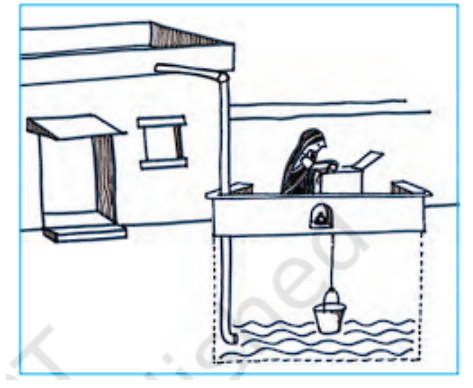 Answer:
The water collected on the roof comes down in the pipes and gets stored in the tank below.
Answer:
The water collected on the roof comes down in the pipes and gets stored in the tank below.
Q3. Have you ever faced a shortage of water in your area? If yes, then what was the reason for it? Talk to your grandmother or any elderly person. Find out, when they were of your age:
Answer:
Yes, we face water shortages, especially in the summer. My grandmother says that when it gets very hot, there's less water available. This happens every year during the warmer months.
Q4. From where did they get water for the house? Has there been a change now?
Answer:
In the past, people collected water from natural sources like rivers, ponds, wells, and hand pumps for their household needs. However, there has been a change over time. Nowadays, many people receive their water from suppliers, which is delivered to homes through a more modern and centralized system. This shift reflects changes in water sourcing and distribution methods.
Q5. What kind of water arrangements were made for travellers – for example piau, mashak (leather bag) or any other? Now what do people do about water when they travel?
Answer:
Previously, travelers relied on public water points like 'piau' and 'mashak' for hydration. Now, travelers prefer carrying personal water bottles or buying bottled water, reflecting changes in travel and hydration practices.
NCERT Solutions for Class 5 EVS Chapter 6: Customs related to water
Q1. Can we even imagine life without water?
Answer:
No, life cannot exist without water. It's essential for all living things.
NCERT Solutions for Class 5 EVS Chapter 6 - Find out:
Q1. Is there a lake, well or step well near your house or school? Visit it and find out more about it. How old is it? Who got it built?
Answer:
Near my house, there's an old lake said to be over a hundred years old, built by the king of Raj, as my grandmother told me.
Q2. What kinds of buildings are around it?
Answer:
Around it, there are both new buildings and ancient wells.
Q3. Is the water clean? Is it cleaned regularly?
Answer:
The lake water isn't clean, and regular cleaning isn't something that's commonly observed.
Q4. Who all use the water?
Answer:
The water is primarily used by villagers for cleaning tasks.
Q5. Is there any festival celebrated at this place?
Answer:
Every year, a boating festival is joyfully celebrated at this lake.
Q6. Is there any water today, or is it dry?
Answer:
Currently, the lake has a bit of water, though not fully dry.
Related Links -
NCERT Solutions for Class 5 EVS Chapter 6: Discuss
There are two old wells in the area where Punita lives. Her grandmother says that about fifteen - twenty years ago there was water in these wells. The wells could have dried up because:
-
Water is being pumped up from under the ground, with the help of electric motors.
-
The lakes in which rain water used to collect are no longer there.
-
The soil around trees and parks is now covered with cement. w Is there some other reason for this? Explain.
Answer:
There could be multiple factors contributing to the drying up of the wells in Punita’s area beyond the three reasons mentioned:
-
Changes in Rainfall Patterns:
If the region has experienced a decrease in rainfall over the years, this would naturally lead to lower water levels in wells, as there's less water seeping into the ground to replenish them.
-
Increased Water Demand:
As populations grow, so does the demand for water. If more water is being extracted from the ground for residential, agricultural, or industrial use, this can cause the water table to drop.
-
Climate Change:
Alterations in climate patterns can result in less predictable and often reduced rainfall, contributing to the wells drying up.
-
Deforestation:
The removal of trees can lead to a reduction in the water-holding capacity of the soil, exacerbating the drying of wells and lakes.
Q1. Is there some other reason for this? Explain.
Answer:
Besides the mentioned reasons, the drying up of wells could also be due to increased deforestation, which reduces the area's ability to retain water. Additionally, a lack of maintenance for the wells and irregular cleaning could contribute to their inability to hold water as efficiently as before. These factors, combined with changing climate conditions, might further exacerbate the situation, leading to the wells drying up.

NCERT Solutions for Class 5 EVS Chapter 6 The Story Today
Q1. Let us see the different ways in which people manage water today.
Do you get water in your house in any of these ways? Put a tick (✓) on that. If you get water in some other way, write in your notebook.
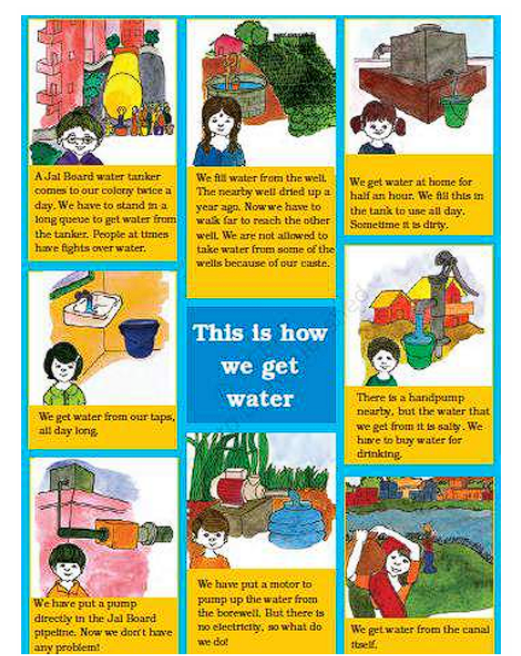 Answer:
In our house, we receive water through several ways shown in the picture, like water supplied by the Jal Board through pipelines. Additionally, we also have:
Answer:
In our house, we receive water through several ways shown in the picture, like water supplied by the Jal Board through pipelines. Additionally, we also have:
-
A hand pump that draws water from an underground source.
-
Water tankers that deliver water directly to our area.
-
Direct access to water from the Jal Board via pipelines.
NCERT Solutions for Class 5 EVS Chapter 6: Discuss
Q1. Everyone has the right to live. Yet, is everybody getting enough water to live or even water to drink? Why is it that some people have to buy drinking water? Should it be like this? Water on this earth is for one and all. Some people draw out water from the ground by deep bore wells. How far is it correct? Have you ever seen this? Why do some people put a pump directly in the Jal Board pipe line? What problems would other people face due to this? Do you have any such experience?
Answer:
Not everyone gets enough water, and it's unfair that some must buy it. The scarcity of water leads to this situation. Using deep bore wells to draw water can lower the water table and harm the environment.
When people use pumps on Jal Board pipelines, it causes unequal distribution, and others get less water. This isn't right because water should be shared fairly. I've also faced water scarcity, which shows the importance of managing our water resources better for everyone.
NCERT Solutions for Class 5 EVS Chapter 6 - Look at the bill and tell
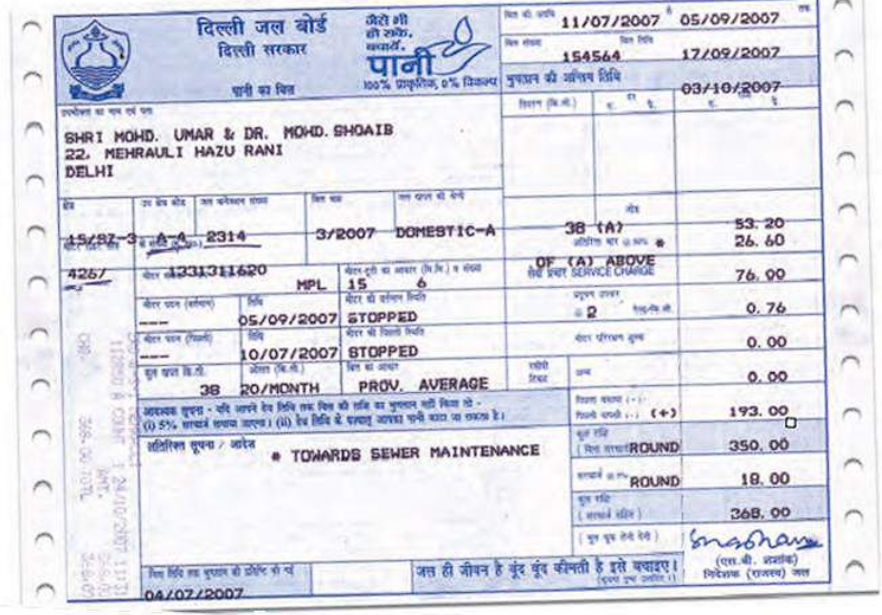
Q1. From which office has this bill come?
Answer:
This bill has been issued by the Delhi Jal Board.
Q2. Do you get a water bill at home? Find out from where it is sent.
Answer:
Yes, we receive a water bill at home, which is sent by the local municipal water supply board.
Q3. Why do you think Dilli Sarkar (Government of Delhi) is written under Delhi Jal Board?
Answer:
'Dilli Sarkar' is mentioned under the Delhi Jal Board to indicate that the Jal Board is an entity governed by the Government of Delhi.
Q4. In whose name is the bill? How much money do they have to pay for each month?
Answer:
The bill is issued to Shri Mohd. Umar & Dr. Mohd. Shoaib. They need to pay Rs. 368 per month, as shown on the bill.
Q5. Do you have to pay for water? How much? Is the rate of water different in different colonies? Ask your elders
Answer:
In our house, we pay for water, about Rs. 500 monthly. The water rates are consistent across different colonies, as per my knowledge.
Activities for NCERT Solutions for Class 5 EVS Chapter 2
NCERT Solutions for Class 5 EVS Chapter 2 brings to life “The Snake Charmer’s Story” with exciting puzzles, crosswords, and fun facts. Dive into activities that expand your learning through creativity and play, making the journey into the world of snake charmers educational and entertaining.
Click here to learn more
NCERT Solutions for Class 5 EVS Chapter 6 - What We Have Learnt
Q1. Make a poster: Do you remember the slogan – “Water on earth is for one and all.” Think of some other such slogans. Draw pictures and make a nice poster.
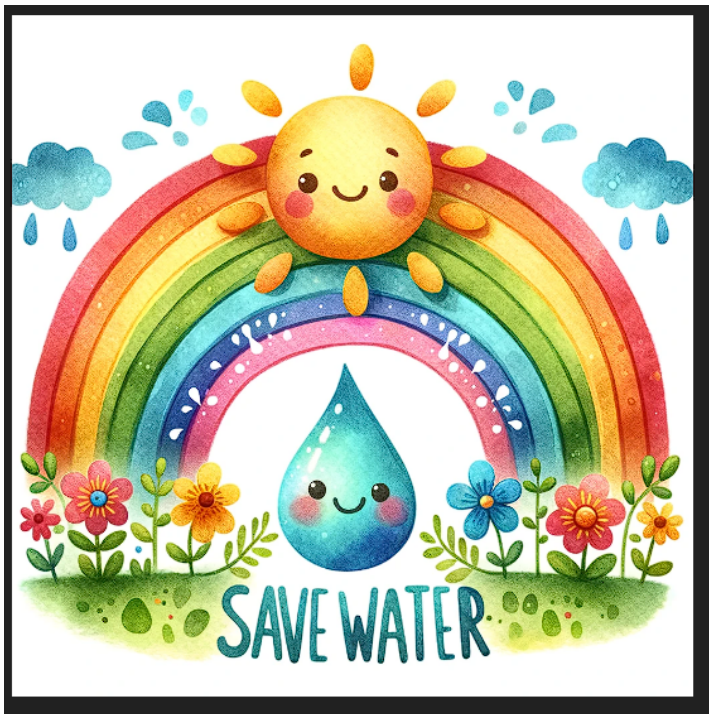
Q2: Bring a water bill, look at it and tell –
-
This bill is from__________date to__________date.
-
How much money is to be paid for this bill?
-
What else can you see in the bill, like the money spent on repair, maintenance etc.?
Answer:
-
This bill is from
Jan 1 2023
date to
31 Dec 2023
date.
-
Rs 500 is paid per month for the entire year.
-
It includes repair and maintenance cost also.
Importance of NCERT Solutions for Class 5 EVS Chapter 6
In Class 5, 'Every Drop Counts' chapter from EVS unveils the crucial role of water conservation in our lives. It highlights historical and contemporary methods of water management, emphasizing the importance of every single drop.
This chapter guides young learners through the significance of sustainable water use, showcasing innovative water conservation practices from various cultures.
The NCERT solutions for this chapter, meticulously developed by educational specialists, serve as an essential guide for students. They provide insightful answers to exercises and encourage a deep dive into the subject matter, thus enabling a comprehensive understanding of water's value in our ecosystems and communities.
Leveraging these solutions enhances students' knowledge on conserving water, developing their critical thinking skills, and fostering a responsible attitude towards natural resources. It also helps in instilling a sense of stewardship for the environment, promoting actions that contribute to water sustainability.
Benefits of NCERT Solutions for Class 5 EVS Chapter 6
NCERT Solutions for Class 5 EVS Chapter 6, "Every Drop Counts," provide indispensable support for students aiming to grasp the essence of water conservation. These solutions offer numerous advantages:
-
Environmental Stewardship:
The chapter and its solutions teach the importance of water conservation, urging students to become caretakers of this vital resource.
-
Historical Knowledge:
It sheds light on traditional water management techniques, enhancing students' understanding of cultural heritage and its relevance today.
-
Critical Awareness:
The solutions foster critical thinking about water usage, conservation strategies, and their impact on society and the environment.
-
Confidence in Assessments:
Comprehensive answers prepare students for examinations, building their confidence to address questions related to water conservation effectively.
-
Conceptual Clarity:
Any doubts about water management practices or conservation strategies are clarified, ensuring a solid grasp of the subject.
-
Engaging Learning Experience:
With interactive content and illustrative examples, the solutions make learning about water conservation an engaging and informative process.
-
Curricular Alignment:
These solutions align with educational standards, ensuring that students are well-prepared for academic challenges while being informed about crucial environmental issues.
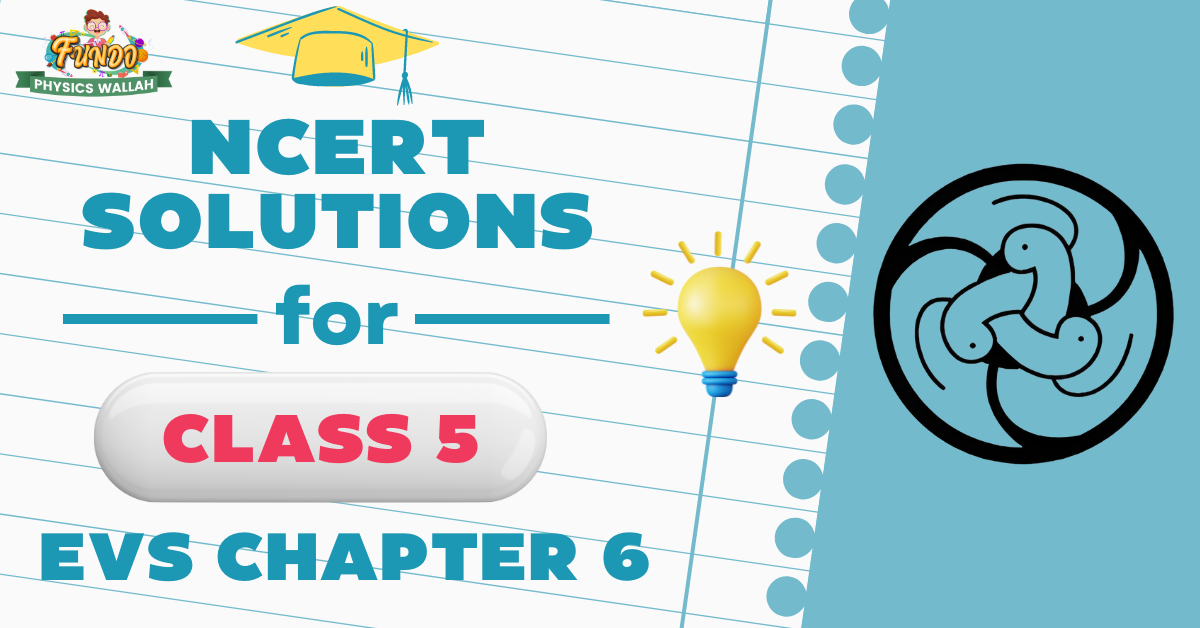

 Answer:
The water collected on the roof comes down in the pipes and gets stored in the tank below.
Answer:
The water collected on the roof comes down in the pipes and gets stored in the tank below.

 Answer:
In our house, we receive water through several ways shown in the picture, like water supplied by the Jal Board through pipelines. Additionally, we also have:
Answer:
In our house, we receive water through several ways shown in the picture, like water supplied by the Jal Board through pipelines. Additionally, we also have:


